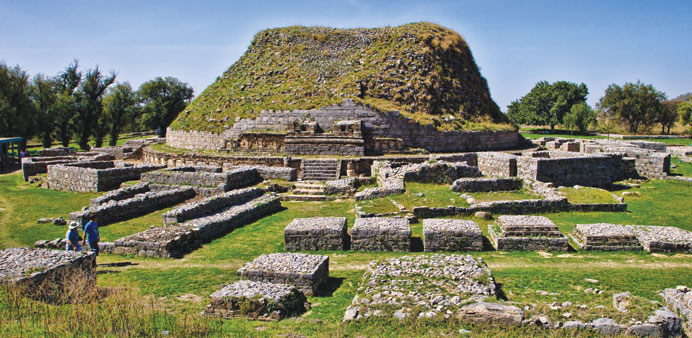Internews/Islamabad
Security concerns have adversely affected tourism in Pakistan, and one of the worst affected is Taxila, home to Buddhist sites and Gandhara Civilisation near capital Islamabad.
This area was declared a Unesco World Heritage Site in 1980, and also a top tourist destination.
However, a quick glance at the official data of the Department of Archaeology and Museums reveals that Pakistan is no more a favoured tourist destination for foreign tourists.
Official data shows that in 2012, 3,100 foreign tourists visited Taxila Museum and the adjoining archaeological sites, especially Sirkap and Dharmarajika Stupa, located in Taxila valley.
In 2013, this number was around 3,000. In 2010 and 2011, 2,434 and 2,474 foreign tourists visited these sites, respectively.
The data further reveals that there has been a 33% decrease in local tourists, as 144,000 people visited Taxila in 2013, compared to 215,000 in 2012.
Deputy Director Department of Archaeology and Museums Irshad Hussain said data on tourists was obtained through ticket sales at the museum and various archaeological sites. He further said official and state guests as well as educational trips were not included in the data.
Asim Meer, the president of a non-government organisation The Voice, commented on the issue saying that the drastic decline in the number of tourists was linked to lack of initiative taken by the authorities.
Gandhara Week Festival, which attracted religious tourists especially monks from all over the world, has not been organised since 2008 due to security reasons.
A senior archaeologist at the Federal Department of Archaeology said bureaucratic attitude, poor planning, prevailing law and order situation, poor management of ancient sites and museums had all contributed to dwindling number of tourists in the area.
Negative travel advisories and poor policies of the tourism ministry form a major reason for the lack of foreign visitors to these ancient sites.
Another archaeologist said that internal problems, including attack on Karachi airport and killing of tourists in Gilgit-Baltistan had resulted in the perpetual postponement of the Gandhara week.
The festival attracted a large number of foreign tourists from Buddhist countries, especially Japan, Korea and Thailand, he said.
A visit to the archaeological site revealed that some of the locals, who depend on tourists to earn their livelihood, were forced to scale back their businesses. Hotels in the area have also suffered greatly, as tourists avoid staying overnight in the area.
A local motel, which was providing quality food and accommodation to local and foreign tourists, also closed down this year.
A resident, Malik Tahir Suleman, said, “For 40 years, I have seen foreign tourists visiting this place. But lately, their number has come down. I just wish the situation improves and the tourists return.”
Ilyas Khan, a master artisan who carved black stone, bid farewell to his work and has now opened a tea stall.
Talking to this reporter, he said that lack of tourists in the region forced him to switch his profession.
Tanveer Manzoor, a local gift-shop owner, said sale at his store had declined. Foreign tourists come once in many months, he said, adding that he might switch his business just like many others who have closed down their shops.
Senior information officer at the Tourism Information Centre, Taxila, Syed Arshad Shah said despite terrorists tarnishing the country’s image, tourism should not be discouraged in Pakistan.
“Are we the only ones facing disturbances,” he asked. “India, Sri Lanka and even Thailand are facing similar problems.”
Shah urged that we should learn from Sri Lankan tourism industry and also pointed out lack of promotion of domestic tourism in Pakistan.
Department of Archaeology and Museum Deputy Director Irshad Hussain confirmed the correlation between terrorism and lack of tourism. He, however, said that the department had enhanced security at Taxila Museum and constructed a security room and installed CCTV cameras in the complex.
Curator Taxila Museum Mohamed Nasir Khan said the authorities were aware of the threats, adding that, “PC-I for the strengthening and upgradation of the existing security had been approved and was being executed.”
He said an eight-foot wall and fences with barbed wires have already been constructed, while walk-through gates, CCTV system and provision of high-end security staff is being carried out.

There are a number of world heritage sites present in Pakistan and Taxila is one of them.
